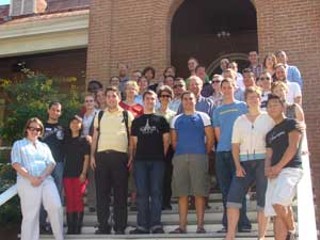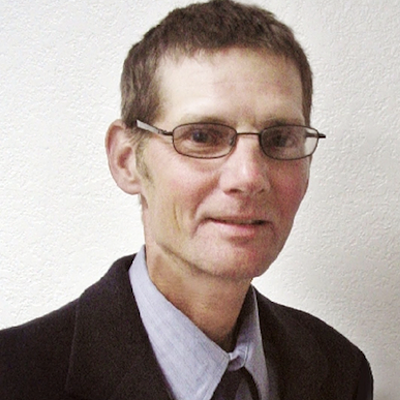Humphrey, an associate dean of students, is gay. To protect the health of his partner--a stay-at-home parent--and their children, the only affordable option was to turn to AHCCCS, the state's taxpayer-funded health plan.
However, that all changed on Wednesday, Oct. 1: Humphrey, like other LGBT families at the UA, is now able to bring his family into his insurance plan at work, because the university will start offering domestic-partner benefits, allowing equal access to health-care benefits for LGBT and straight unmarried employees' partners and their children. This is a policy change throughout all of state government.
It's been a long time coming, Humphrey says. He first arrived at the UA in 1998 to work as a residence-life director. Back then, his partner was allowed to live with him in the apartment at the dorm where he worked--but Humphrey's partner couldn't get a parking permit. It was obvious back then that the UA needed to enact policy changes to make LGBT staff and faculty feel safe and welcomed, and to recruit and retain faculty members who happened to be LGBT.
"We have a celebration planned," Humphrey says, regarding the domestic-partner benefits. "Everyone is thrilled this has finally come."
The thrill, however, comes with some trepidation: Anyone who applies for the benefits must provide proof they are in a committed relationship by providing records that show financial interdependence (like shared bank accounts, a lease or mortgage, a will, etc.), and prove that the domestic partners have lived together for more than a year.
Humphrey says the problem with those requirements is that at the UA, straight couples don't even need to prove they're married.
"These are issues, but they don't take away from the importance of having domestic-partner benefits. We will work through these challenges," Humphrey says.
Life for LGBT employees has greatly improved over the last decade at the UA. One example of that change was the creation last year of an Office of LGBTQ Affairs by UA President Robert Shelton. Cathy Busha, then Wingspan's program director, was hired to lead the office.
In about a year, Busha has created numerous new programs; these include efforts that focus on Latino LGBT-related issues, and a brown-bag lunch series that invites people who are out in their workplaces to talk to students about being out at work.
However, Friday, Oct. 3--two days after domestic-partner benefits go into effect--happens to be Busha's last day as director of LGBTQ affairs. She's leaving Tucson next week to take a new job in Denver, as programs director at the GLBT Community Center of Colorado, a statewide advocacy organization.
Busha modestly claims that what's been accomplished at the UA in the last year has less to do with her and more to do with the work of the UA's LGBT faculty, as well as a caring UA administration.
Busha and Humphrey concur that the benefits and the creation of the LGBTQ Affairs Office are due to the good works of Shelton, as well as former UA President Peter Likins.
"The biggest factor is my finding a supportive upper-level administration. We've also had two presidents that understand human rights," Humphrey says.
While Shelton is credited with helping to institute domestic-partner benefits, Likins is credited with organizing an LGBT Advisory Council that started addressing policy issues. Likins says he remembers someone at a UA town hall meeting once asked when an LGBT Affairs Office would be created, seeing as the UA already had offices for physically disabled students, as well as African-American, Native-American, Latin-American and Asian-American students.
"It was a good question," Likins says.
Likins says he focused on getting state approval for tuition benefits for gay domestic partners. (Shelton later extended those benefits to include straight domestic partners.) During Likins' time, he worked to get other state universities on board, but Northern Arizona University and Arizona State University declined.
Likins says he always suspected conservative state legislators weren't happy with these institutional changes taking place at the UA--but he didn't really care.
"This has been very natural for me, while for others, it could be dangerous because of the political exposure. But as presidents, we are in a position of power. No one even faces you to say, 'You can't do that.' No one ever said that to me," Likins says.
Likins says his push to make LGBT policy changes "is a natural extension of my lifelong commitment to combat prejudice wherever I find it.
Shelton did not respond to a Weekly e-mail for comment as of press time.
Beverly Seckinger, a professor and interim director of the UA School of Media Arts, sees a different UA than what she encountered when she first arrived in 1991.
With what she describes as a "green, naïve, pretty-young group of professors," Seckinger says she marched into the provost's office to demand support for LGBT and sexuality studies. A committee was formed, although there were no resources--but it was this same group Seckinger worked with to start the Lesbian Looks Film and Video Series in 1993.
"We started very humbly with that founding bunch of professors. To get started, a friend of mine and I sat down with a cup of coffee and a Women Make Movies catalog; we rented a room and got 100 bucks here and there from our department and other departments," Seckinger says.
Some 15 years later, the series continues on Oct. 3, with part of the series held this year at the Loft. Seckinger says community partnerships with Wingspan have always been important for the series, but this year, Busha's office was able to help with outreach and film selection.
Humphrey says Busha's programs will continue after her departure, and a national search will begin this month to find her replacement.
"We did a national search last time, and we want to do as thoughtful of a search this time. Cathy has a strong structure in place. She's been here almost a year, but leaves a strong legacy behind."













